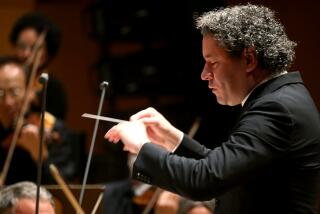Alfred Schnittke; Composer
- Share via
HAMBURG, Germany — Alfred Schnittke, one of the former Soviet Union’s most prolific composers, whose works ranged from symphonies to themes for Russian movies, died Monday. He was 63.
Schnittke died at Hamburg’s University Hospital, where he had been admitted after suffering a stroke, his wife, Irina, said.
“A genius composer and the most outstanding of my friends has died,” said Russian cellist Mstislav Rostropovich, who conducted and played the premieres of many of Schnittke’s pieces.
Russian President Boris Yeltsin sent a telegram to Schnittke’s wife in Hamburg, saying that he shared her family’s “huge grief” and that “a great composer of modern times has departed.”
A creator of “polystylism,” or the mixture of musical forms, Schnittke was spurned in his homeland at the beginning of his career, but by the 1980s had won over Soviet cultural authorities.
His work was familiar to Southern California concert-goers. The West Coast premiere of his Third Violin Concerto was given at the Los Angeles County Music Center in 1985, his Third String Quartet at UC San Diego’s Mandeville Auditorium in 1989 and his Fourth Symphony at Los Angeles’ Japan America Theater the same year.
“Written in 1984. . . . the symphony is a maze of jarring complexities, a jumble of climactic devices and a thoughtful essay in dynamic contrasts,” wrote then Times music critic Martin Bernheimer of the Japan America Theater performance. “It reflects brilliant craft at every convoluted turn.”
Overall, Bernheimer decided, “Alfred Schnittke may just be the most intoxicating Soviet export since vodka.”
When Bernheimer interviewed the composer in Boston during a Soviet arts festival in 1988, Schnittke described his radical evolution: “My musical development took a course across piano-concerto romanticism, neoclassic academicism, and attempts at eclectic synthesis, and took cognizance also of the unavoidable proofs of masculinity in serial self-denial. Having arrived at the final station, I decided to get off the already overcrowded train. Since then I have tried to proceed on foot.”
Schnittke was born November 24, 1934, in Engels, a small town on the Volga River in an area that had been settled by Germans in the 18th century.
The son of a German-born Jew of Latvian descent and a German Catholic from the Volga region, he was influenced by both German and Russian cultures.
Music began to play a role in his life in 1946 when his family moved to Vienna. He began piano lessons and soon developed an interest in composition.
Returning to the Soviet Union with his parents two years later, Schnittke enrolled at the Institute of the October Revolution, a music preparatory school in Moscow. He later attended the Moscow Conservatory.
As part of his graduation requirements, he composed an oratorio called “Nagasaki” that included an atomic blast as part of the score--an early glimpse of the unorthodox musical approach he would adopt in later years.
In 1961, he joined the conservatory faculty and continued to compose.
Schnittke’s long list of compositions includes five symphonies, a piano concerto, four violin concertos, six ballets and arrangements of works by Shostakovich, Berg, Joplin and others.
More to Read
The biggest entertainment stories
Get our big stories about Hollywood, film, television, music, arts, culture and more right in your inbox as soon as they publish.
You may occasionally receive promotional content from the Los Angeles Times.










